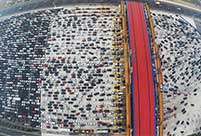

 |
| Job seekers attend a job fair in September in Hangzhou. White-collar workers are facing fierce competition in changing jobs, a report said on Oct 13, 2015. [Photo/China Daily] |
Competition for white-collar jobs became fiercer in the third quarter, with more than 35 job seekers contending for the same position on average.
This is a jump from 26 and 29 in the first and second quarters this year, a Chinese human resources website said on Tuesday.
Zhaopin.com's third-quarter jobs report for white-collar workers showed that demand for talent was shrinking with the slowdown of China's economic growth. At the same time, more such workers were considering changing jobs, leading to more competition among job hunters, especially those in Northeast China and in second-tier cites.
In Zhaopin's competition index for major cities, Shenyang and Dalian, both in Liaoning province, and Changchun, Jilin province-all in Northeast China-ranked first, fourth and eighth.
Zhu Hongyan, chief career consultant for the website, said the career structure in the northeastern region has been constantly improving because of economic restructuring.
"As the economic structure of Northeast China evolves, traditional industries have been forced to upgrade, while new industries gained more space to develop," Huang said.
"The changing economic structure affects certain traditional careers. The need for professionals in certain fields declined, and some even disappeared," Huang said.
"Workers in these industries are forced to seek career opportunities in other ones, increasing competition in the market for job seekers."
Moreover, second-tier cities such as Chengdu, Sichuan province, Suzhou, Jiangsu province, Xi'an, Shaanxi province, and Tianjin are all among the top 10 cities with the most competitive job market.
Beijing ranked ninth, while Shanghai ranked 18th.
Zhu, the career consultant, said the trend of white collar workers shifting their jobs to fast-developing second-or third-tier cities has become more prominent because of the high pressures of working and living in larger cities, deteriorating environments and restrictions on cars and housing.
"Regional preferential policies have helped second-and third-tier cities attract overflow industries and companies from the overcrowded metropolises, which have their own restrictions such as limited land and other resources," Zhu said.
"However, second-and third-tier cities do not have the same mature economic structure and industries as the metropolises," added Zhu. "So not all job seekers can find satisfactory jobs."
Fact box
Ranking based on the index to measure and demonstrate competition in the job market in major cities in Q3:
1. Shenyang, Liaoning province
2. Chengdu, Sichuan province
3. Shenzhen, Guangdong province
4. Dalian, Liaoning province
5. Suzhou, Jiangsu province
6. Tianjin
7. Xi'an, Shaanxi province
8. Changchun, Jilin province
9. Beijing
10. Guangzhou, Guangdong province
 Photos of beautiful teacher hit the Internet
Photos of beautiful teacher hit the Internet Winding mountain road
Winding mountain road
 Math teacher makes 'solar powered electric car'
Math teacher makes 'solar powered electric car' Heavy traffic turns expressway into huge parking lot
Heavy traffic turns expressway into huge parking lot Chinese-American girl selected as Rose Parade princess
Chinese-American girl selected as Rose Parade princess Top 10 nominated designs at BJDW
Top 10 nominated designs at BJDW Fashion show staged in Forbidden City at night
Fashion show staged in Forbidden City at night Construction of HK-Zhuhai-Macao Bridge enters final stage
Construction of HK-Zhuhai-Macao Bridge enters final stage Art photos of Chinese beauty in Han Chinese clothing
Art photos of Chinese beauty in Han Chinese clothing On a collision course
On a collision course China exports elite education
China exports elite education Chinese firms bid for Australian cattle ranch
Chinese firms bid for Australian cattle ranch UNESCO honors Nanjing Massacre memories
UNESCO honors Nanjing Massacre memoriesDay|Week